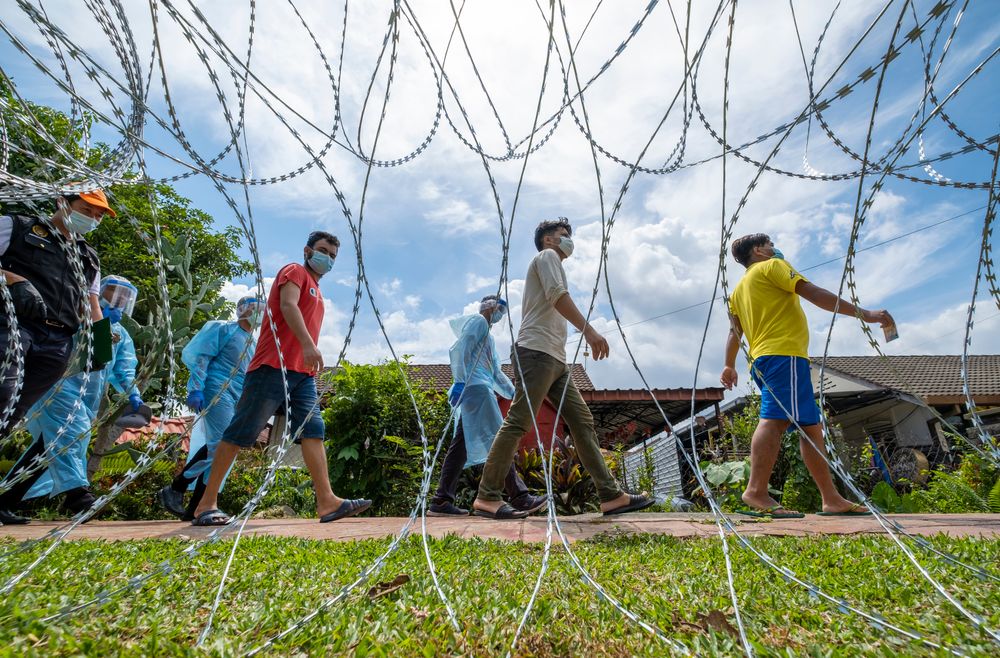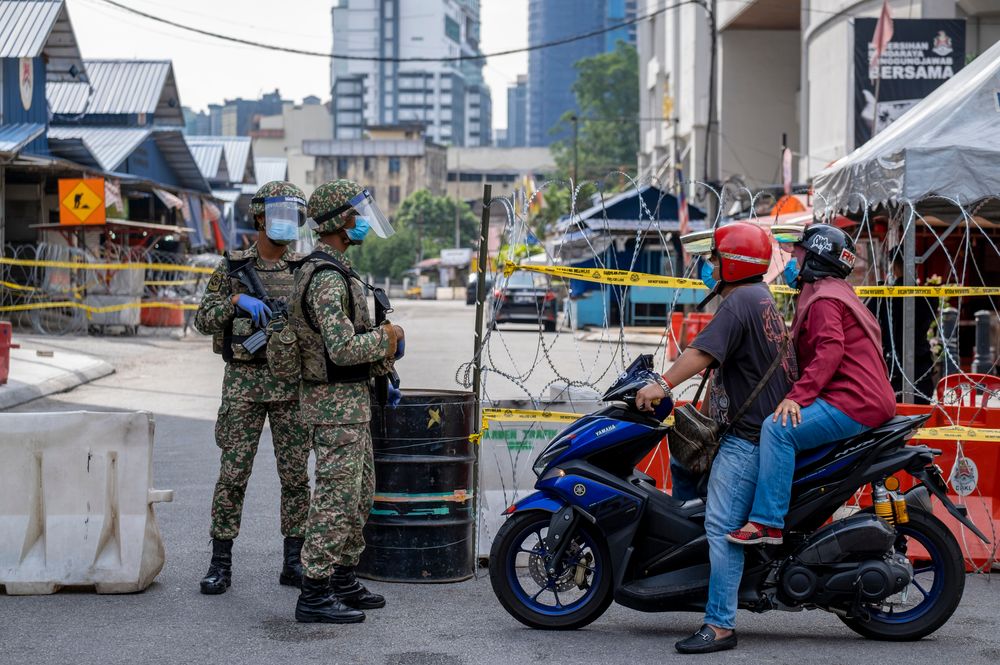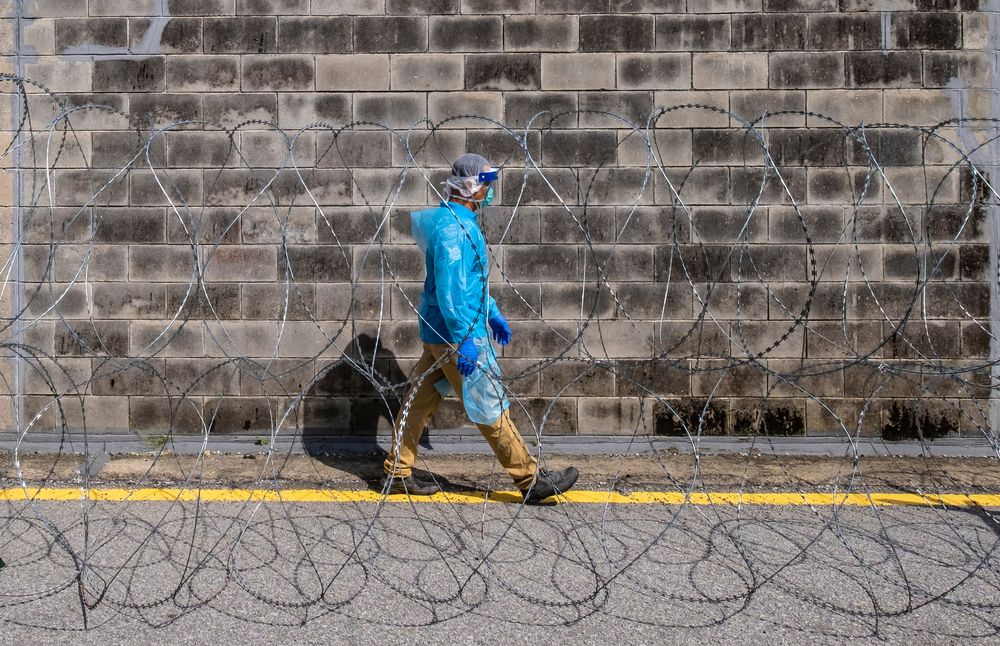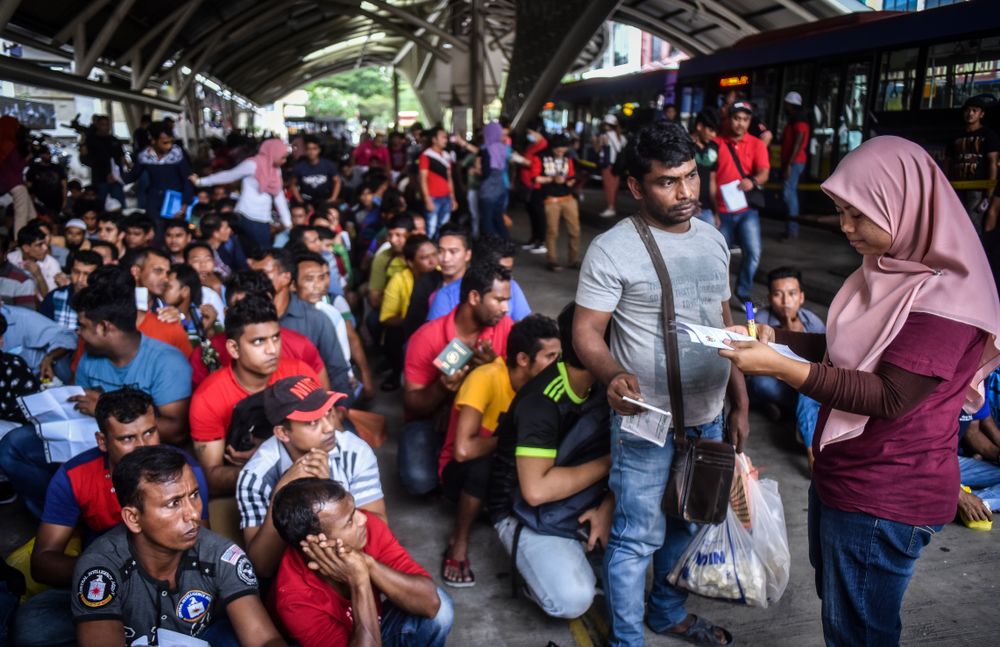Malaysia detains thousands of migrants in sting operation
Authorities use ruse of screening for coronavirus to raid apartment complexes in Kuala Lumpur for undocumented migrants and prep them for deportation

For eight weeks or so from the end of February, Malaysia had received widespread recognition for its handling of the coronavirus pandemic sweeping the globe.
The cabinet quite rightly placed public health above almost all other concerns, even to the point of gambling with the economy by instituting a strict nationwide lockdown, requiring the public to stay indoors, only to venture outside to buy food.
As such, to date, Malaysia’s casualty list — roughly 6,700 reported cases and 110 deaths — remains mercifully light compared to some nations.
Yet, the country’s achievements could come undone after recent events at low-cost apartment complexes in downtown Kuala Lumpur.

Malaysian soldiers guard the entrance to a wet market in Chow Kit, Kuala Lumpur, May 6 after a batch of new coronavirus infections were detected. (shutterstock.com photo)
Malaysian soldiers guard the entrance to a wet market in Chow Kit, Kuala Lumpur, May 6 after a batch of new coronavirus infections were detected. (shutterstock.com photo)
As part of Malaysia’s drive to eradicate the virus Defence Minister Ismail Sabri Yaakob — who heads the National Security Council responsible for managing the crisis — and director-general of health Dr Noor Hisham Abdullah repeatedly asked the 1 million or so undocumented migrants nationwide to step forward for coronavirus screening.
Time after time, the two men reassured this social demographic they had nothing to fear, there would be no repercussions from the tests, this was a national health crisis and as such immigration status was not an issue.
You can understand the trepidation on the part of the migrants, risking deportation back to their country of origin, be it Bangladesh, India, Myanmar, Indonesia or any other country where grinding poverty or political persecution make life there unbearable.
However, despite their initial reluctance, migrants did begin to step forward. At the same time, four Kuala Lumpur districts were quarantined.
It was no coincidence the population density in these districts is high, while housing a large proportion of migrant labour with as many as 10 people packed into each apartment, usually fit for two or three occupants.
Prime breeding grounds for a virus so easily contracted.
Looking back, the writing was on the wall. With the areas patrolled by police and army, the authorities began active screening of residents, who complained officials ignored their own hygiene protocols, while testing was chaotic.
However, Malaysia is nothing if not a chaotic country, so for a mass screening to turn into a bit of a bunfight was to be expected.
Then, on Labour Day, events took an ominous turn.

Under the guise of a sanitation operation, the Immigration Department moved in to one of the districts.
Officers went door-to-door, rounding up hundreds of people.
Anyone who did not have valid papers was herded into the street and lined up to be carted away in trucks; scenes which would for Europeans be haunting in their familiarity.
The authorities say a few hundred illegal workers were detained in a systematic and no less hygienic sweep of the complexes.
Residents — and independent images from the raid — paint a different picture of people held in the street and then loaded on to trucks with little or no regard for social distancing. Some say mobile phones were confiscated and the sweep appeared to be targeted undocumented migrants in general, including refugees, with children as young as four caught up in the raid.
The raid received widespread condemnation from human rights groups and civil society organisations, including the United Nations, some of which said the actual number of people detained was in the thousands.
The government defended the raid — and the subsequent raids Immigration made on the buildings over the next few days — as necessary and a co-ordinated effort to weed out illegal workers.
No one was really buying it, because at first Immigration tried to keep its operation under wraps, but — having systematically gone through each of the quarantined districts over a 10-day period — there seemed little point in keeping up the pretence.
In the latest of the raids in which thousands of people were carted away, charities allege people — including children — were held in the open for hours, and denied access to food and water.
Mass arrest in Malaysia detained 261 women and 98 children. This includes many vulnerable #asylum seekers & #refugees from #Myanmar who fled persecution - identified as undocumented migrants. Malaysian Immigration Law requires undocumented migrants to be deported. pic.twitter.com/dTgedeM3vJ
— APRRN (@APRRN_) May 12, 2020
From a national health perspective, numerous groups pointed out that rounding people up in such a manner risked another outbreak at the detention centres.
Remember, this isn’t a tiny fraction of the Malaysian workforce. Migrant labour accounts for more than 10 percent of the country’s 30 million population, sweating in the factories, tilling the fields, sweeping the streets.
Meanwhile, a journalist covering the first raid for the South China Morning Post is facing the prospect of criminal charges for provocation causing breach of the peace — a vague all-encompassing section of the law the police uses on dissenters.
Yet, it was the manner in which the government broke its promises that had observers agog.
Authorities should end immigration raids and release detained refugees and migrants in #Malaysia to protect public health amid COVID-19. Watch here: pic.twitter.com/C2d8APTtvx
— Fortify Rights (@FortifyRights) May 6, 2020
This was not a surreptitious U-turn for which politicians the world over are renowned.
It was outright deception, using the threat of a deadly pandemic with the aim of luring out thousands of innocent people for deportation. Civil society group Lawyers for Liberty said the action sent a “chilling message” to migrants of what will happen if they were to come forward in future.
Therein lies another threat, as undocumented workers are now far less likely to seek medical treatment for symptoms and thus continue to infect others.
The ugly incident also paints a picture of Malaysia that the authorities would rather people not see, as it continues to act with contempt to undocumented migrants.

Regardless of the current health crisis, news reports of immigration officers raiding various residences or places of work for undocumented migrants regularly pepper the national headlines.
Ironically, the picture state media portrays is the Immigration Department battling a never-ending influx of illegal workers with criminal intent, as if they are a plague-like scourge.
However, similar reports of the unscrupulous people responsible for them brought to justice are curiously rare to the point of non-existent.
We cannot kid ourselves that these menaces are a handful of rotten apples and hence the lack of news, because 1 million or more illegal workers in country can lead you to no other conclusion than human trafficking on an industrial scale.
Some charities allege the rot extends deep into Malaysia’s civil service, with bribes and inducements finding their way all the way up to the most senior levels.
The authorities maintain they are the model of integrity, but the sheer size of the problem makes that argument seem flimsy at best — and a denial that is not going to make things go away.
So, while the new normal is the cliché the world clambers to embrace, persecution of undocumented migrants is an old normal Malaysia seems unwilling to relinquish any time soon.
Gareth Corsi is a freelance journalist based in Malaysia. The views expressed in this article are the opinions of the author and do not necessarily reflect the editorial stance of LiCAS.news.
Published May 15, 2020
© Copyright MMXX LiCAS.news

Illegal foreign workers arrested by Malaysia Immigration Department during raid in Kuala Lumpur on Oct. 18, 2018. (shutterstock.com photo)
Illegal foreign workers arrested by Malaysia Immigration Department during raid in Kuala Lumpur on Oct. 18, 2018. (shutterstock.com photo)
